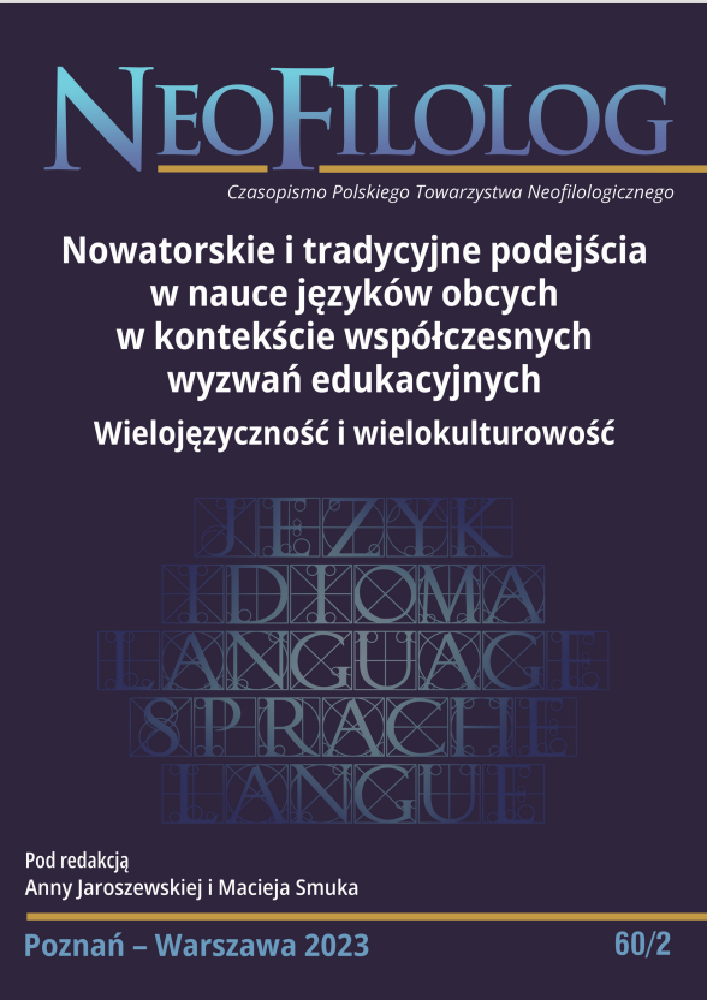Abstract
Clarified and detailed in the CEFR – Companion volume (2020), mediation gains a new dimension. The proposed scales of mediation activities clearly focus on action-oriented, situational use of language. However, the theoretical description of these activities, and the scaling of specific skills are not enough to be able to effectively develop mediation competence in pedagogical practice. In order to understand the specifics of mediation activities, concrete guidelines are needed for the construction of mediation tasks and application in the process of language teaching and learning. The purpose of this article is to present selected issues related to the creation and implementation of mediation tasks, which give new meaning to the learning process and can be seen as a practical form of applying an action-oriented approach.
References
Biedermann A. (2014), La médiation linguistique dans un contexte d’enseignement des langues étrangères. « Synergies Chili », no 10, 83–91. Online : https://gerflint.fr/Base/Chili10/biedermann.pdf [consulté le 20.08.2022].
Conseil de l’Europe. (2001), Cadre européen commun de référence pour les langues : apprendre, enseigner, évaluer. Paris : Conseil de l’Europe/Les Éditions Didier.
Conseil de l’Europe. (2021), Cadre européen commun de référence pour les langues: apprendre, enseigner, évaluer – Volume complémentaire. Strasbourg : Éditions du Conseil de l’Europe.
Coste D., Cavalli M. (2015), Éducation, mobilité, altérité : les fonctions de médiation de l’école. Strasbourg : Conseil de l’Europe. Online : http://www.coe.int/t/dg4/Linguistic/Source/LE_texts_Source/LE%202015/Education-Mobility-Otherness_fr.pdf [consulté le 20.08.2022].
Council of Europe. (2022), Enriching 21st century language education. The CEFR Companion volume in practice. Strasbourg : Council of Europe Publishing.
Council of Europe. (2020). Common European Framework of Reference for Languages: Learning, teaching, assessment – Companion volume. Strasbourg : Council of Europe Publishing.
Hallet W. (2008), Zwischen Sprachen und Kulturen vermitteln. Interlinguale Kommunikation als Aufgabe. « Der fremdsprachliche Unterricht Englisch », no 93, 2–7.
Huver E. (2018), Penser la médiation dans une perspective diversitaire, « Recherches en didactique des langues et des cultures », n° 15/2. Online : http://journals.openedition.org/rdlc/2964 [consulté le 20.08.2022]. DOI: https://doi.org/10.4000/rdlc.2964
Janowska I. (2020), Zadaniowa koncepcja kształcenia językowego w materiałach do nauczania języka polskiego jako obcego. « Acta Universitatis Lodziensis, Kształcenie Polonistyczne Cudzoziemców », no 27, 505–526. DOI: https://doi.org/10.18778/0860-6587.27.30
Janowska I., Plak M. (2021), Działania mediacyjne w uczeniu się i nauczaniu języków obcych. Od teorii do praktyki. Kraków : Księgarnia Akademicka. DOI: https://doi.org/10.12797/9788381386807
Kolb E. (2009), Finite Resources – Infinite Communication: Sprachmittlung im Englischunterricht der Unterstufe. « ForumSprache », no 1, 69–86.
Kolb E. (2016), Sprachmittlung: Studien zur Modellierung einer komplexen Kompetenz. Münster/New York : Waxman.
Komorowska H. (1999), Metodyka nauczania języków obcych. Warszawa : WSiP.
Melo-Pfeifer S., Schröder-Sura A. (2018), Les tâches de médiation dans les manuels de Français Langue Étrangère pour le secondaire en Allemagne, « Recherches en didactique des langues et des cultures », no 15/3. Online : http://journals.openedition.org/rdlc/3589 [consulté le 20.08.2022]. DOI: https://doi.org/10.4000/rdlc.3589
North B., Piccardo E. (2016), Élaborer des descripteurs illustrant des aspects de la médiation pour le Cadre européen commun de référence pour les langues (CECR). Conseil de l’Europe, Strasbourg. Online : https://rm.coe.int/elaborer-des-descripteurs-illustrant-des-aspects-de-la-mediation-pour-/1680713e2d [consulté le 20.08.2022].
Piccardo E., North B. (2019), The Action-oriented Approach : A dynamic vision of language education. Bristol : Multilingual Matters. DOI: https://doi.org/10.21832/9781788924351
Reimann D. (2014), Sprachmittlung, « ProDaZ: Deutsch als Zweitsprache in allen Fächern ». Online: https://www.uni-due.de/imperia/md/content/prodaz/reimann_sprachmittlung.pdf [consulté le 20.08.2022].
Stathopoulou M. (2015), Cross-Language Mediation in Foreign Language Teaching and Testing, Bristol : Multilingual Matters. DOI: https://doi.org/10.21832/9781783094127
Vygotski L.S. (1997), Pensée et langage. Paris : Éditions La Dispute.
License
Copyright (c) 2023 Iwona Janowska

This work is licensed under a Creative Commons Attribution-NoDerivatives 4.0 International License.
Authors
Authors of texts accepted for publication in Neofilolog are required to complete, sign and return to the Editorial team’s office the Agreement for granting a royalty-free license to works with a commitment to grant a CC sub-license.
Under the agreement, the authors of the texts published in Neofilolog grant Adam Mickiewicz University in Poznań a non-exclusive, royalty-free license and authorize the use of Attribution-NoDerivatives 4.0 International (CC BY-ND 4.0) Creative Commons sub-license.
The authors retain the right to the free disposal of the work.
Users
Interested Internet users are entitled to use works that have been published in Neofilolog since 2017, under the following conditions:
▪ attribution – obligation to provide, together with the distributed work, information about the authorship, title, source (link to the original work, DOI) and the license itself.
▪ no derivatives – the work must be preserved in its original form. Without the author's consent, it is not possible to distribute the modified work in the form of translations, publications, etc.
Copyrights are reserved for all texts published since 2017.
Miscellaneous
Adam Mickiewicz University in Poznań retains the property right as a whole (layout, graphic form, title, cover design, logo etc.).

